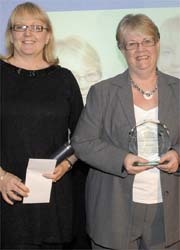Pregnant Jessica
Wales - Jessica Tate is pregnant. Hers is a normal pregnancy. There is, however, some concern because she wants her baby to be born at home, but is often alone there because her partner must travel for his work. Mid-term, she is tired and has mild anaemia. At one stage in her pregnancy she also falsely believes labour has started and is worried. However, all should go well. She benefits from having many midwives.
Report: Brenda Marsh

How? Jessica is a virtual woman and the fascinating computer programme in which she lives is helping student midwives to hone their diagnoses.
Monitoring the virtual pregnancy - Via graphics, video and sound, the students follow her pregnancy from its early stages to early labour. They can move the mouse over computer-enhanced photo images of her pregnant abdomen to draw up a clearer picture of the uterus and foetus and information is revealed gradually, as it would be if the student were using his or her hands to examine a pregnant patient. A click on key words will also produce vital current information.
Communication skills - In video clips the interactions between a midwife and Jessica are shown and students are asked to assess good or bad communication skills.
Used since 2004 at Swansea University in Wales, this programme has won a top award from the UK’s Royal College of Midwives for ‘… using technology to explain the process of pregnancy very clearly and simply,’ said Dame Karlene Davies, general secretary of the RCM.
Jessica was created by midwifery lecturers Susanne Darra and Marian McIvor who, inspired by virtual training programmes used by other departments at the university, decided to create one for midwifery. They worked with the University’s School of Health Science computer assisted learning department and the resulting programme has not only helped students to learn through Jessica, but also ‘she’ has helped them to promote deliveries with the minimum intervention. ‘Winning this was a great reward for all the hard work we had put in - however we couldn’t have done it without the help of many of our colleagues.’
This innovative programme is now being offered to other midwifery schools in Wales and it is hoped that it will spread to other midwifery teaching centres.
09.04.2008





